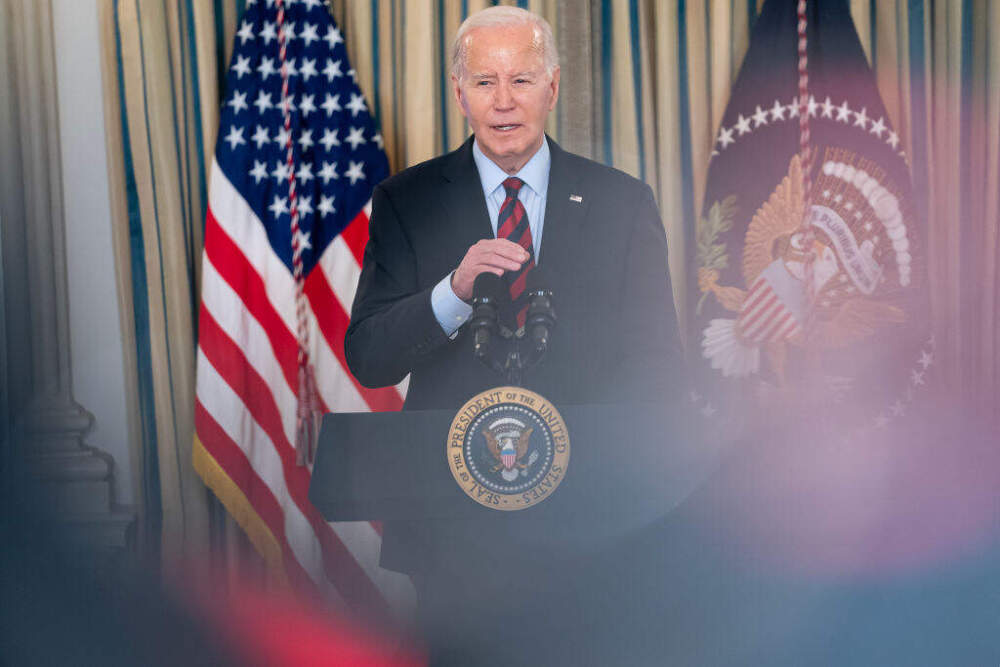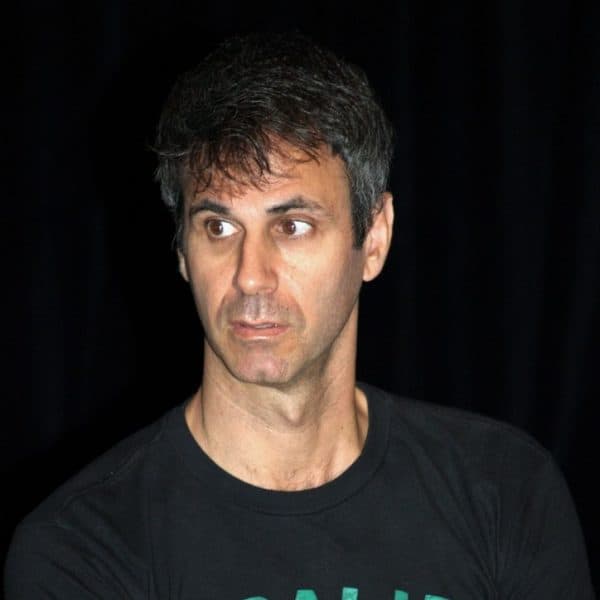Advertisement
Commentary: The Fifth Estate
Why is Joe Biden's age an indictment?

This evening, Joe Biden will deliver his annual State of the Union address under a thick cloud of skepticism. Biden, we have been told — over and over and over again — is too old to be president.
No matter what he says during the speech, it will be seen through the prism of this claim. (Was Biden’s gait stiff as he took the podium? How many verbal gaffes did he make?) It will all be parsed, ad nauseum, as if his job were to serve, not as president, but the TV pitchman for a geriatric supplement.
Not once will any of reporter or pundit offer proof of Biden’s diminished capacity. Because, at this point, there is none.
Let me repeat that, because it doesn’t seem to be sinking in: there is no empirical evidence that Joe Biden’s age has compromised his ability to serve as president. Not one person who has seen him in action has substantiated this claim. From a journalistic standpoint, it’s all smoke, no fire.
By every meaningful metric, Biden has been an excellent chief executive. He guided America out of the COVID pandemic. He helped marshal a series of landmark bills through a divided congress, and thereby seeded an economic recovery few thought possible. Inflation and unemployment are down, GDP and wage growth are up. His administration has been corruption and drama free.
The national crisis we face isn’t Biden’s age, but the craven and confused manner in which our Fourth Estate covers politics. As in 2016, the central “issue” emerging in the 2024 race is “scandal” manufactured by right-wing propagandists, amplified by social media and legitimized by mainstream outlets.
Exhibit A is the lead story in the New York Times last Sunday, which trumpeted a public opinion poll that showed American voters are … concerned about Joe Biden’s age.
A few decades ago, the Times might have previewed the State of the Union with an article about the actual state of the union. That is: a story based on facts about how Americans have done under the Biden administration. Jobs. Wages. Health care. Foreign policy.
The national crisis we face isn’t Biden’s age, but the craven and confused manner in which our Fourth Estate covers politics.
But today, its editors run a story that regurgitates the opinions they themselves helped create. Rather than quoting economists or sociologists or other experts who actually study the state of the union, we hear from voters who have been inundated with insidious coverage.
A voter named Otto Abad says that he won’t vote for Biden again because he doubts the president is up for a second term.
“If he was in this sort of mental shape, I didn’t realize back then. He’s aged a lot.”
There’s an obvious reason that Abad’s perceptions of Biden may have shifted: because it is based on clip reels blasted out by Fox News and Russian bots, then taken up by the traditional media.
Another voter, Shermaine Elmore, ventures the following:
“I don’t think he’s in the best health to make a decision if the country needs the president to make a decision.”
It’s worth flagging this declaration because it is so ludicrously presumptuous. How would Elmore have any basis to judge Biden’s ability to make decisions?
The answer is: he doesn't. And the Times knows he doesn’t. In this sense, the Times story is nothing more than a closed feedback loop. The headline might as well read: Americans Bombarded with Feeble Biden Memes Declare Biden Feeble.
The Times writes that it may be “impossible” for Biden “to completely reassure voters about his age given the inexorable march of time.” This is a typical media dodge. The Times helps create a negative sentiment, then reports on that sentiment as if it had nothing to do with creating it. (The same thing applies to the poll results about the direction of the country. Americans report the country is “on the wrong track” largely because all they see online are endless reiterations of this doomsaying.)
What the New York Times poll really shows is that our electorate has lost its way. We no longer judge leaders based on the results they produce, because the media no longer bothers to inform us. They simply churn out pieces that repackage and sell back to us our distorted perceptions.
If all this has an eerie familiarity, that may be because the media made the same catastrophic mistakes during the 2016 campaign. This is how Hillary Clinton’s mismanagement of her email accounts became a bigger story than (for instance) Trump’s long history of fraud, racial incitement, boasts about sexual assault and Russian collaboration.
The same warped dynamic is at play today, which is why you have CNN posing the preposterous question, “Is Biden’s age now a bigger problem than Trump’s indictments?”
Just as no one could ever say how Clinton’s email bungling might endanger the country, no one is offering any precise sense of how Biden’s age makes him unfit. Will he forget who our allies are and start cozying up to murderous dictators? Will he try to use his vast powers to seek revenge on his enemies? Will he get confused and disoriented and forget who serves in his administration? Will he declare himself above the law?
Because Donald Trump has already done all that.
The truth is, the right’s effort to smear Biden is based on a virulent ageism that pervades American consumer culture, in which youth is equated with status and power, and aging is viewed as a shameful and inevitably degrading process.
The Biden campaign is starting to push back on this idea — to call out the press for trafficking in insinuations based on bigotry. They would do well to point out that age can be a source of wisdom, making us more reflective and less reactive.
Even better, they should take a page from Ronald Reagan’s playbook. As he demonstrated during his debate with Walter Mondale, it’s better to embrace your age with good humor than get defensive about it.
The Biden campaign should also stop hiding him away, which reinforces the idea that he has something to hide. Biden is who he is. He’s not a smooth talker. He makes gaffes, as he always has. He’s slowed down a step, but he has the country headed in the right direction.
He should take a page from his opponent, as well, who has normalized his political identity by hogging the public spotlight. Voters accept his incoherence, his shameless lies, and his violent rhetoric, as Trump being Trump.
Biden should also draw a distinction between aging and maturation, between the physical self and the mental one. This would allow him to reframe the race as one between an 81-year-old incumbent who has gained wisdom over the years, and a frenetic 77-year-old who displays the moral reasoning and impulse control of a 4-year-old.
Would you rather have your grandpa in charge of our nuclear weapons, or your toddler?
To be clear: I’m under no illusion about how aging can diminish cognition. I saw it first-hand with my own mother. But I also have a father who, at 85, is the wisest and most clear-eyed person I know.
Would you rather have your grandpa in charge of our nuclear weapons, or your toddler?
The age smear against Biden also reflects a fundamental misunderstanding of the job of the presidency, which is not to strut around making speeches, but to set an agenda and make careful, considered decisions — behind closed doors, in consultation with experts and advisors— about what will best serve the American people.
Aping an alpha predator on cable TV isn’t part of the gig. Performing isn’t the same as job performance.
You would think that the shameful shadow of the 2016 campaign, along with the disaster of the Trump presidency and the Jan. 6 attack on the Capitol would compel traditional media outlets to stop retailing unsubstantiated scandals.
Is it possible that they can course correct, and publish stories focused on the effects of governance, rather than inflammatory accusations, fear-mongering talking points, and horse-race journalism that privileges polling over policy?
Yes. But it’s more likely that the Times and its ilk will continue to write poll stories, which tend to go viral. That being the case, I hope going forward they choose to pose questions based on empirical truths rather than conjecture.
Such as:
Given that a jury found Donald Trump liable for sexual assault, and that he has previously bragged about grabbing women by their genitals, do you worry about his ability to govern in a manner that respects women?
Or:
Do Donald Trump’s lies about the 2020 election, and his indictment for inciting a violent riot at the Capitol, call into question his understanding of democracy?
Or how about this:
What’s more important in a presidential candidate, their age or their desire to serve the public good?
Editor's note: This commentary is part of Steve Almond's regular Cog column during the 2024 election, "The Fifth Estate." Email him with comments and ideas at stevealmondjoy AT gmail.com.

